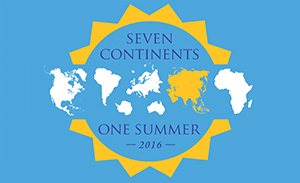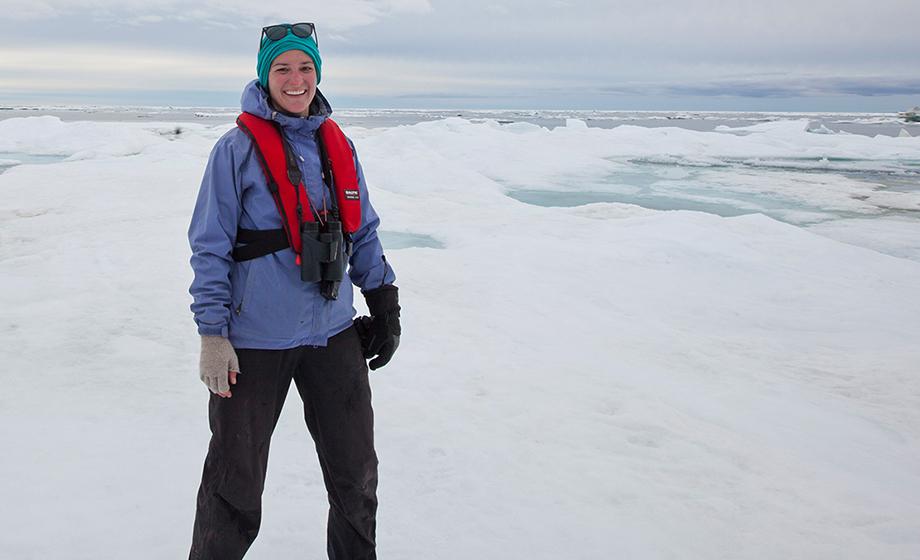
Clark University graduate student Meghan Kelly’s summer job as a cruise director might bring to mind visions of island hopping, basking in the sun and relaxing poolside in a deck chair.
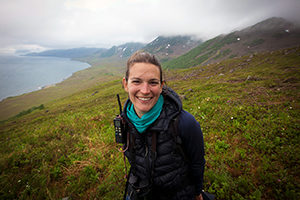
Meghan Kelly finds during an
exploration on shore.
In actuality, Kelly’s job with Heritage Expeditions, a New Zealand-based expedition travel company, takes her places far outside of a typical Caribbean cruise, to Antarctica, the South Pacific, the Far East and, this summer, to the Arctic. Besides traveling to far-flung destinations, she’s also getting the chance to work closely with scientists and pursue her interest in researching native Arctic wildlife. She has already applied that research to her coursework at Clark, where she’s studying environmental science and policy as well as business administration.
Traveling worldwide is nothing new to Kelly, M.B.A./ES&P ’18 (pictured above in the Arctic). Since earning an undergraduate degree at the University of California at San Diego in 2006, the California native has nearly circled the globe.
As a U.S. Peace Corps volunteer for three years, Kelly worked on various environmental resource management projects in rural areas of Fiji. Her interest in expedition cruising began when she signed up for a cruise to Antarctica in 2006 and met several people who had traveled aboard the Heritage research vessel, the Spirit of Enderby. That shipboard connection ultimately helped her land a job with Heritage in 2011.
“Heritage is one of the smallest expedition companies in the industry. I had never heard of them,” she explains. “I was just lucky to meet the right people.”
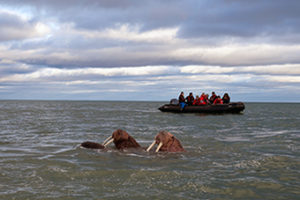
Now cruise director, Kelly is involved in “a little of everything” on board the ship. She is in charge of on-board programming, the ship’s accounting, Zodiac inflatable watercraft excursions and the general well-being and experience of as many as 55 paying guests, who may be simple sightseers or serious research scientists. She aims to know and foresee their trip needs, although she admits she has to be very flexible.
“I have responsibilities, but I can’t predict the day-to-day operations, which keeps things interesting – especially changes in weather, which can change a whole day or even a whole trip for the passengers,” Kelly says. “You never know how a trip will turn out, but that’s part of the fun.”
This summer’s expedition to the Russian Far East was one of Kelly’s shorter experiences. Between May 23 and Aug. 1, the ship made four trips to the Arctic, changing passengers when it returned to a Russian port every two weeks.
This story is part of our 7 Continents, 1 Summer series, which highlights the interesting work that Clark students, faculty, alumni and staff are doing all over the world.
In July, Kelly accompanied a group to Wrangel Island, a protected nature sanctuary in the Arctic Ocean, near Alaska and Siberia, and administered by the Russian government. In the past, thick sea ice prevented any visits to the island until mid-August. But this year was the earliest that the Spirit of Enderby had ever sailed there.
Kelly can’t help but think that global warming has had an impact on ice conditions. She’s aware of research by scientists like Clark University’s Karen Frey, associate professor in the Graduate School of Geography, who has documented how Arctic sea ice has been replaced by open ocean in the summer.
“There has been a pronounced decrease in the summer sea ice extent, an overall thinning of the ice and a lengthening of the summer melt season, all of which have profound consequences for the cycling of carbon as well as the dynamics of the entire food web throughout the region,” Frey said in 2014 after receiving a three-year, $614,339 National Aeronautics and Space Administration (NASA) grant to study the impacts of retreating sea ice cover in the Pacific Arctic.
Although Kelly readily admits she’s not a full-blown Arctic researcher, she has had a front seat to observe the impact of climate change over the past six years. On her recent trip, she observed numerous bowhead whales, endangered creatures that do not migrate south from Arctic and sub-Arctic waters unless water temperatures change.
“It has been interesting to see these slight changes in climate and the environment,” she says.
Meanwhile, working alongside scientists, Kelly has pursued her research interests in other wildlife species, such as the spoon-billed sandpiper. Last year, she completed a final project on the species for a geographic information science course. This summer, she had a rare encounter with the bird – something many researchers have never had.
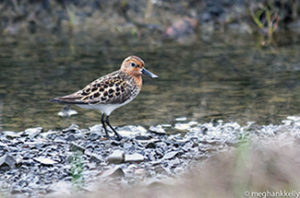
this spoon-billed sandpiper during
a trip ashore in the Arctic.
(photo © Meghan Kelly)
“I had been working with researchers for the last five years,” she begins. “I first helped them survey the sandpipers’ habitat for nesting sites, and every year since then we have spent many long days trying to find other nesting sites, or hopefully catch a glimpse of the birds. This summer, the trips only allowed for one day dedicated to sandpiper searching. That day, I heard over the radio that some of my colleagues had found a nesting pair.”
Excited, Kelly anchored her boat and made her way across the tundra. While trying to locate the pair, she heard another bird call. Thinking it was just a sound-alike species, she double-checked through her binoculars. She was delighted to spot what she had been searching for the last five years: a spoon-billed sandpiper.
“I couldn’t believe it,” Kelly explains. “I grabbed my camera and took as many photos as I could and then called my colleagues to let them know I had seen another nesting pair. I was the only one to see that pair. It was special.”
Now back at Clark, Kelly looks forward to continuing her graduate program this fall.
Her business management coursework, she believes, will help her become a more effective researcher.
“I have seen research that has not been managed well, and it is detrimental to the project,” Kelly explains. “You can achieve so much more with the same resources when projects and people are managed well.”

